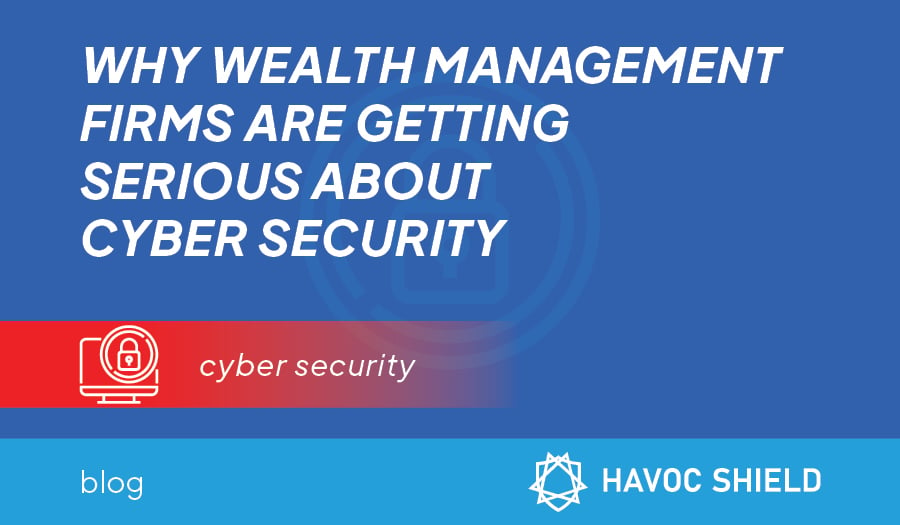
Why Wealth Management Firms Are Getting Serious About Cyber Security
April 01, 2022
Wealth management firms play a significant role in handling financial transactions and dealing with investments for various clients. So it’s clear why cybercriminals would view even a small firm, as an opportunity.
By gaining access to your IT infrastructure, hackers could compromise client accounts and walk off with a treasure trove of financial data. The rise of attempts against wealth management firms has caused many to take a more active approach to cyber security.
Security Vulnerabilities in Wealth Management Firms
While there are shared challenges that different industries face regarding cyber security, wealth management firms must deal with a unique set of circumstances. For example, you’re collecting and storing a wide range of information that could be worth a lot of money to certain individuals. While specific data security, privacy, and compliance standards apply to wealth management firms, you may still have holes in your security posture that put you at risk.
1. Information sharing
Sending emails containing personal information should not be allowed throughout an organization. However, it’s the kind of thing that still happens even when it shouldn’t. If a hacker managed to intercept one of those communications, that could lead to catastrophic consequences for your firm.
2. Securing Third-party Vendors
Like many companies that provide wealth management services, you may rely on third-party vendors for services like designing new software or obtaining market data. If they’re not taking the time to implement stringent security standards, you put your own company at risk. A regulator looking into a data breach won’t care that it’s the fault of a vendor employee downloading malware into your system.
3. Weak Passwords Could be Your Biggest Threat
The strongest security systems can’t protect against poor password standards. There’s no reason for any of your employees to continue getting away with just using their first and last name as a login. In addition, you can’t have workers continually reusing the same password because there are no checks in place to stop that from happening.
The Top Cyber Attacks Against Wealth Management Firms
Now that we have a better idea of where your firm might be vulnerable, let’s look at some of the ways hackers attempt to exploit those holes in your security.
-
Malware - Attackers typically generate malware, or malicious software, attacks against company devices like employee laptops or smartphones. Because of your firm’s position in the finance industry, workers would be a prime target for hackers looking to steal credentials or data. According to a report from Accenture, it can cost a company an average of $2 million to recover from a malware attack.
-
DDoS Attack - A Distributed Denial of Service (DDoS) attack is one where hackers send multiple requests to your firm’s web application. The goal is to overwhelm the website’s capacity to handle the attempts, causing the site to malfunction.
Like many wealth management companies, you may have your employees relying a lot more on cloud-based services and mobile devices to accommodate their daily work. Unfortunately, that leaves hackers with more routes to send disruptive DDoS attacks that disrupt your ability to deliver services to clients.
-
Phishing - Phishing attacks are a kind of social engineering attack often executed against workers at various companies. For example, hackers might create a spoof email purportedly from the company CEO. The goal is to dupe the recipient into giving up critical information the attacker can exploit, including anything from installing malware or stealing data.
Cyber Security Best Practices for Wealth Management Firms
We’ll start with the biggest one: educating employees. Unfortunately, too many companies become cybercrime victims because workers don’t know how to recognize a hacking attempt. While it pays to invest in a robust security platform, nothing beats preparing your workers to deal with social engineering attempts to steal credentials, or worse.
Some other practices you might want to make standard within your firm include:
-
Eliminate the use of thumb drives — If an employee backs up company data on a thumb drive and ends up losing it, that information immediately goes up for grabs. In addition, a hacker could install malware on a drive and wait for an unsuspecting worker to plug it into their laptop connected to the company network. You might want to consider disabling auto-run on company-issued computers.
-
Execute penetration tests — Penetration testing evaluates the current state of your wealth management firm’s security. A tester attempts to use those vulnerabilities to gain access to your company systems. Automatic penetration testing can help you find issues within places like wireless networks, web applications, and endpoints.
-
Enforce strong password policies — The easiest way for hackers to get into your company’s system is by making guesses at easy password combinations. Hackers typically take one password and try applying it to different logins until they find success. In addition to forcing users to come up with more complex passwords, you can set up two-factor authentication as a secondary security measure. That way, even if a hacker gains access to credentials, they must provide a second form of identification before gaining access.
Get Ahead of the Security Game
Don’t wait until you’re under attack to reinforce your cyber security. Havoc Shield helps wealth management firms protect themselves against cyber threats and secure a cybersecurity insurance policy while complying with the standards of their industry. Try our platform for yourself by setting up a demo with a Havoc Shield representative.